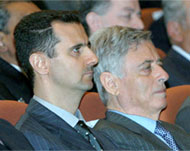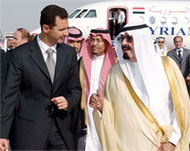France in talks on Khaddam asylum
Aljazeera’s correspondent in Paris has learnt that an official French delegation travelled to Saudi Arabia to discuss the possibility of Abdul Halim Khaddam, the former Syrian vice-president, obtaining asylum in the kingdom.

Khaddam, who moved to Paris after resigning in June, has said in interviews since December that Bashar al-Assad, the Syrian president, had threatened al-Hariri shortly before he was killed in a car bombing on 14 February. Al-Assad has denied the allegation.
Sources told Aljazeera on Friday that the Saudis rejected the idea of hosting Khaddam, upon which the French delegation left for the United Arab Emirates to discuss the asylum issue with government officials there.
The French team has yet to get a final word from the UAE, the sources said.
In December, Khaddam told Al Arabiya television that the killing of al-Hariri could not have been carried out by Syrian agents without al-Assad’s involvement.
Asked if he thought that the Syrian president was directly responsible for al-Hariri’s killing in Beirut last February, Khaddam told Britain’s Sky News on Thursday: “In my belief, yes, my personal belief is that he ordered it. But at the end of the day there is an investigation. They must give the final decision.”
Popular uprising
Khaddam has said he wants a popular uprising to overthrow the Syrian government, and Syrian officials call him a traitor. Asked if he would use the same word to describe al-Assad, he said: “Yes, I call him a traitor.
“Corruption in Syria is so widespread within the closed circle around the president. He’s practised corruption so much that you see that his cousins control everything. And as far as foreign policy is concerned, his policy is causing humiliation to Syria.”
 |
|
Khaddam(R) with al-Assad at the |
In other news, police on Friday arrested a Syrian on charges of giving false evidence to the Lebanese investigation into the assassination of Rafiq al-Hariri, the former prime minister, a judicial official said in Beirut.
Ibrahim Jarjura was detained on a warrant issued by Ilias Eid, the investigating magistrate, who interviewed Jarjura on two occasions and heard conflicting testimony, the official said, speaking on condition of anonymity because of the secrecy of the investigation.
Lebanon’s official National News Agency reported the arrest, adding that unknown parties appeared to have been using Jarjura to mislead the investigation.
The arrest brings to 12 the number of people that Lebanon has arrested in connection with the truck bombing that killed al-Hariri and 20 other people in central Beirut last February.
Among them are four pro-Syrian Lebanese generals.
Other detainees
Most of the detainees were arrested on the recommendation of the UN commission investigating al-Hariri’s killing. It was not known whether the commission had recommended Jarjura’s arrest.
A second Syrian, Muhammad Zuhair Siddiq, has been detained in France since October when the UN commission recommended his arrest on grounds of giving false evidence to investigators.
 |
|
Al-Assad (L) met Saudi Arabia’s |
Lebanese prosecutors have charged him in absentia with giving false testimony to mislead the UN investigation, and playing an indirect role in al-Hariri’s killing.
On Wednesday, Kofi Annan, the UN secretary-general, appointed Serge Brammertz, a Belgian prosecutor at the International Criminal Court, to head the UN commission.
The first commission chief, Detlev Mehlis, a German prosecutor, stepped down last month.
The commission has accused the Syrian intelligence service of involvement in al-Hariri’s assassination. Syria has denied the charge and said it is unfounded on evidence.